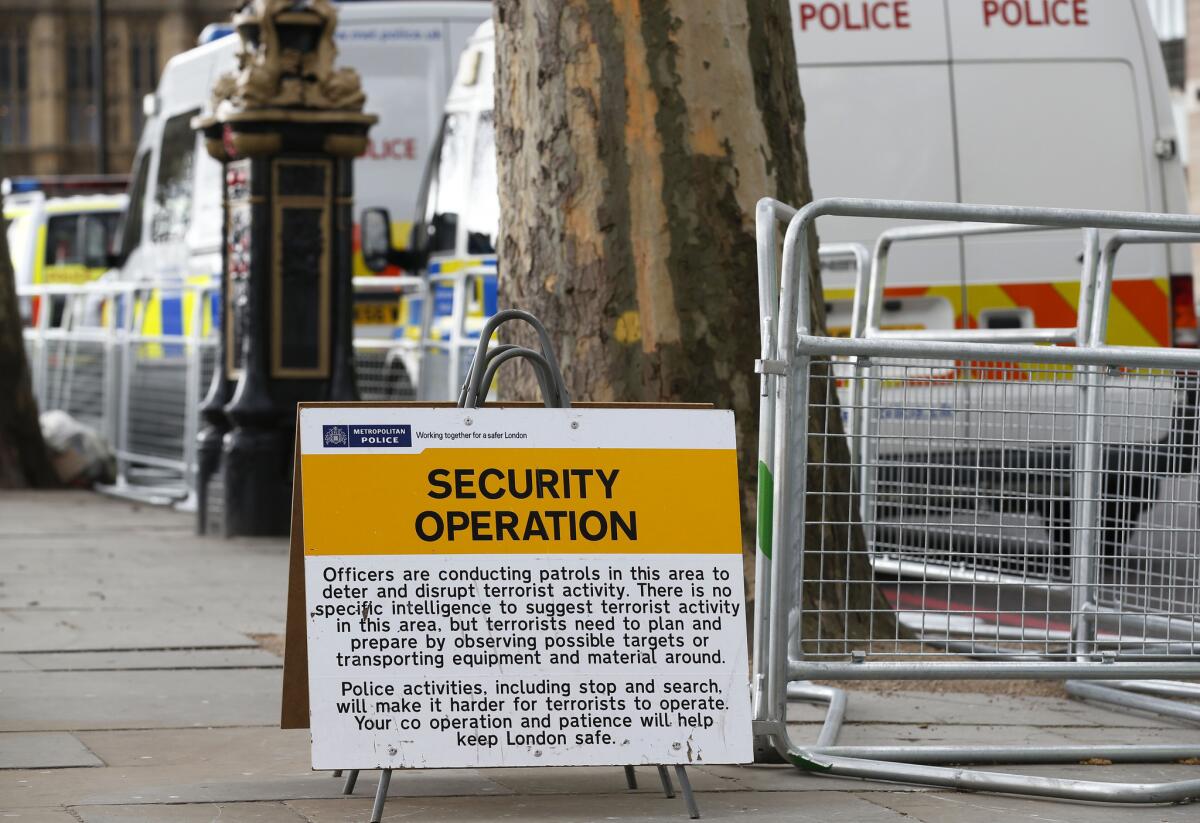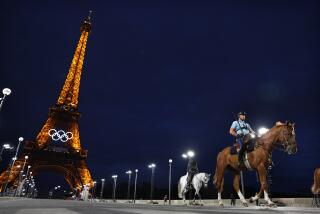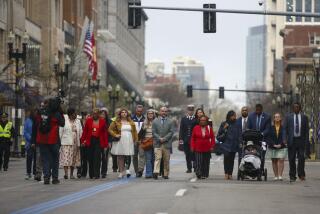London may tighten security for its marathon after Boston bombings

- Share via
LONDON – Security arrangements are under review and could be tightened for this weekend’s London Marathon, which is to go ahead as planned in spite of Monday’s bombings in Boston, authorities and organizers said Tuesday.
Britain’s minister for sport, Hugh Robertson, said he was “absolutely confident” Sunday’s event could take place safely in the British capital, which last year successfully hosted the Summer Olympics. The London Marathon is one of the world’s most prestigious and popular long-distance running competitions, with a route that goes past or over such landmarks as Big Ben, Buckingham Palace and Tower Bridge.
But those iconic structures make security an even greater concern in a city that is itself a favored target for attack by Islamic terrorists and republican militants from Northern Ireland.
[Updated, 10:37 a.m. April 16: Bernard Hogan-Howe, the head of Scotland Yard, told reporters that the force was now “taking more precautions than we might have done otherwise. It’s a very reasonable response to an event such as we’ve seen” in Boston.
He said there was no obvious threat to the London Marathon connected to the attack in Boston.
“We hope we’ll get more information from the Americans as they try and work out what happened,” Hogan-Howe said. “It may be, of course, there is no link at all to the United Kingdom.”]
Robertson said in a radio interview that London had “enormous experience” dealing with security for high-profile events, adding: “This is one of those instances where the best way to show solidarity with Boston is to continue and send a very clear message to those responsible that we won’t be blown off course.”
Scotland Yard is also gearing up for the challenge of securing the funeral Wednesday of former Prime Minister Margaret Thatcher, which will entail the deployment of 4,000 officers.
The former British leader’s coffin will be borne through the streets of downtown London, from the Houses of Parliament to St. Paul’s Cathedral, for a service that dignitaries from around the world are due to attend. Protesters, too, are expected to show up along the cortege route.
“We have a very full and very well-rehearsed security operation” for both the funeral and Sunday’s race, Cmdr. Christine Jones said. “We are working with the London Marathon to make sure that we have all of the tactics in place that we need. But … there has been no change at all to the terrorism threat to the U.K. at the moment.”
The government describes the current threat level of international terrorism as “substantial,” a midrange marker meaning that an attack in Britain is a “strong possibility.”
In February, three British Muslims were found guilty of plotting what would have been the biggest terrorist attack in this country since the 2005 London transit bombings. The three await sentencing for planning a suicide rampage that would have involved detonating up to eight bombs in backpacks in crowded places.
By its nature, strung out over more than 26 miles, the London Marathon presents particular headaches for authorities faced with the task of guaranteeing the safety of more than 30,000 runners and hundreds of thousands of staff, volunteers and spectators.
The route crosses the Thames and weaves and loops through a large swath of the city, from Greenwich Park in the southeast to St. James’ Park in central London. The finish line is a stone’s throw from Buckingham Palace; Prince Harry is expected to present the awards to the winners.
Last year’s Olympic marathon was in many ways easier to secure because the course was more contained, confined to a much tighter area on only one side of the river, and because police were backed up by a huge contingent of private guards and British soldiers.
“In a free society, a race goes through a city, and one of the joys of something like the London Marathon is that it’s open to all spectators,” Nick Bitel, the chief executive of the marathon, told the BBC. “It’s not like on Sunday when we saw a marathon in North Korea where there’s no one watching and no one standing by the side of the street.”
Bitel’s office is continuing to meet with Scotland Yard to refine the policing blueprint for this weekend’s event, although no new or augmented measures have yet been announced.
“We do have robust security measures in place for Sunday’s London Marathon,” Mayor Boris Johnson said. “But given events in Boston, it’s only prudent for the police and the organizers of Sunday’s race to reexamine those security arrangements.”
In Germany, coordinators of the Hamburg marathon, which is also scheduled for Sunday, said they did not plan to beef up their security operation.
“We have no cause to change anything at the moment,” Frank Thaleiser, the head of the event, was quoted as saying by the Hamburger Morgenpost.
ALSO:
Strong Iran quake leaves conflicting reports on casualties
Pakistani Taliban denies involvement in Boston bomb blasts
Obama calls Boston bombings a ‘heinous, cowardly’ act of terror
More to Read
Sign up for Essential California
The most important California stories and recommendations in your inbox every morning.
You may occasionally receive promotional content from the Los Angeles Times.











